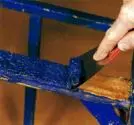Should I Buy Painted Arts & Crafts Furniture?

I even recall seeing an article many, many years ago in which the author was advising his readers to cut the legs down on an Arts & Crafts hexagon table to turn it into a coffee table, then paint it robin’s egg blue.
And I did once buy a Gustav Stickley rocker off a porch in Kentucky. Seems each time they painted the porch, they painted the rocker. “Battleship Gray” was their favorite flavor.
Buying even a Gustav Stickley antique that has been painted brings with it many risks, so bear that in mind as you are negotiating the price. Consider the following:
1.) Oak is a very porous wood. Unlike hard maple, its pores can absorb a stain, two or three coats of a clear finish and still have room for a layer of paint. Getting paint out of those deep pores is never easy and often requires a brass bristle brush.
2.) Paint also seeps into the joints between two boards, especially, as is often the case, if the old glue has let go and the boards have separated slightly.
3.) People, even misguided authors, don’t typically paint a perfect antique, even if it is out of style. I once stripped an oak dresser only to find a deep burn in the shape of a clothes iron. A couple of layers of paint can hide even a hideous scar.
4.) Stripping, sanding or scraping off the paint is also likely to destroy the majority of the original finish. Arts & Crafts finishes, namely shellac, lacquer and an early form of varnish, are fragile and will melt quickly when they come in contact with harsh chemicals, abrasive grits and steel scrapers, none of which do well at getting paint out of clogged pores.
5.) Paint strippers are a diluted form of what they were twenty years ago. It takes more stripper than you would expect to dissolve the paint. Not only is stripper not cheap, when the paint is dissolved, it often penetrates even deeper into the pores, cracks and joints.
So, should you still buy a painted piece of Arts & Crafts furniture?
What the heck – you can always paint it again….
Good Luck!
– Bruce

This article was originally published August 11th, 2014
